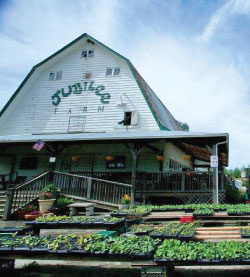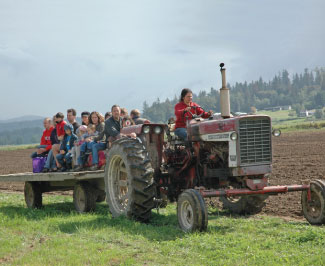Measuring success
By Rick VanderKnyff
This article was originally published in December 2012

How does a land trust measure success? The most visible yardstick is acres preserved and, by that measure, PCC Farmland Trust has had a banner year.
With two farm properties saved in 2012 — the 200-acre Jubilee Farm in Carnation and the 120-acre Reise Farm in the Orting Valley — total acreage under trust protection grew more than 37 percent, to a total 1,169 acres.
But acreage is only one measure. The Farmland Trust is putting an increasing emphasis on metrics that not only guide selection of target properties but also help calculate the effect on the ground. For instance, the trust is working with farmers and volunteers to restore streamside habitat at protected farms in the Orting Valley.
While the trust protects land, we work to foster the conditions for organic and economically viable farming. We don’t want just open land. We want working land producing fresh, organic, local food. We have protected eight properties to date, but the number of working farms is a little more fluid because farm businesses can come and go.
For instance, Orting Valley Farms is a single property supporting three independent farms. Sanford’s Farm recently moved in, replacing a previous tenant, and just completed its first growing season. Meanwhile, at Ames Creek Farm in Carnation, a 20-acre plot that has been mostly fallow for several seasons now is being prepped as pasture for a new tenant, who plans to raise organic lambs.
With those parcels coming back into production, we count 11 working farms on eight properties across the state — from Sequim to Walla Walla. All of them are producing organic food for CSA customers, farmers markets and stands, restaurants and retail markets.
The network effect

In 2011 PCC Farmland Trust adopted a new strategy, considering how to get — with limited resources — the biggest impact with each acquisition. Instead of preserving isolated properties, what if we prioritized specific areas?
Geographic focus became a strategic pillar, and the trust chose the Orting Valley and the Snoqualmie River Valley as two “agricultural corridors” warranting special attention. The preservation of Jubilee Farm in partnership with King County, and Reise Farm with Pierce County, means the trust has preserved two farm properties in each of its focus areas.
With more farmers working contiguous or nearby parcels, it should improve chances for building critical local infrastructure and market outlets. It also should lead to more opportunities for mentoring and knowledge sharing, and better conditions for local government support on zoning and related issues.
To test those assumptions, PCC Farmland Trust has joined with the Trust for Public Land to sponsor an analysis of farmland conservation metrics for an area of the Puyallup Valley. It will include both of our current Orting properties. Over time, the analysis will help determine if there are network effects in building an agricultural corridor. It also could help discover at what point — how many farms and acres, for example — those effects begin to kick in. We’ll want to know, can we take what we’ve learned and apply it to other areas of Washington?
Organic mission
Similar studies have been done in other areas of the country, but only for non-organically farmed land. PCC Farmland Trust is the only organic farmland trust in the nation. It is pioneering a new vision with every new easement.
In late September/early October, I attended the national Land Trust Alliance Rally in Salt Lake City, where there were about 1,600 other land conservation professionals from across the country. It became clear in conversations just how cutting-edge PCC Farmland Trust is, and how other trusts are watching it.
You can walk the farms preserved and see the Farmland Trust’s mission coming to literal fruition. The results of the analysis, due late this month, will help the trust transition from preserving individual farms to fostering healthy, sustainable farming communities and economies. Maybe it also will help other groups follow this model in other parts of the country.
Learn more about PCC’s partnership with the trust »
Rick VanderKnyff is vice president of the PCC Farmland Trust board of directors.
